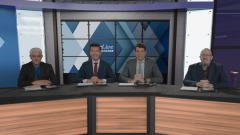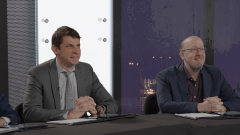
SHINE Study: Ibrutinib Plus Bendamustine and Rituximab in Elderly Patients With MCL
A panel of experts in hematologic malignancies discuss the SHINE study, which looked at ibrutinib with bendamustine and rituximab in elderly patients with MCL.
Transcript:
Alexey V. Danilov, MD, PhD: We just discussed the TRIANGLE study [NCT02858258], which enrolled younger patients with mantle cell lymphoma [MCL], but recently we were treated to exciting data from a clinical trial called SHINE. Bijal, do you mind highlighting some key features of the SHINE trial [NCT01776840]? How do you treat your older patients with MCL?
Bijal D. Shah, MD: Yes. This was a randomized study looking at BR [bendamustine, rituximab] and ibrutinib followed by rituximab and ibrutinib maintenance, with the comparator arm being the same regimen without ibrutinib. What they were able to show is a clear benefit in progression-free survival end points. It was noteworthy. Noteworthy, why? [It was the] first randomized data supporting frontline BTKi [bruton tyrosine kinase inhibitor] use.
For me, it’s not the first trial that supports bendamustine use. We’ve been using bendamustine. We’re familiar with its toxicity, and we understand what it means, as your patient had experienced or the patient that we discussed experienced, [that] infections can be problematic. There are other toxicities, in particular, cardiac, that can be problematic, but it sets the stage. It sets the stage for TRIANGLE. It sets the stage for the trials that are actively ongoing. We’re saying we can start to think about mantle [cell lymphoma] like we think about CLL [chronic lymphocytic leukemia]. [Who] was the last patient with CLL that you gave high-dose chemotherapy to for the extension of failure-free survival? We’re going to get there, and this is where I’m hopeful MRD [minimal residual disease] will also help us, so that as in CLL—again, in mantle [cell lymphoma], it’s harder—but we may be able to start to tease apart some of these additional details about when to stop.
Alexey V. Danilov, MD, PhD: Do you start all of your patients on a combination of BR and ibrutinib?
Bijal D. Shah, MD: There’s no one-size-fits-all approach. We are aggressive about screening for TP53 mutations at presentation. We are less likely to put a patient like that on chemotherapy; we’re going to try to focus on something like lenalidomide or another targeted approach that will hopefully help us to bypass the TP53 mutation. In general, you should know this…I’m a bendamustine hater. [The] concern that I have is the immune suppression that we see with bendamustine, but not just in the short term. As we start pivoting to our salvage approaches, like CAR [chimeric antigen receptor] T-cell therapy, we’re learning quickly that bendamustine can encumber that somewhat. So I’m not a big bendamustine user. I’m more focused on novel agents to try to secure better outcomes for my patients, but there’s no one-size-fits-all [treatment].
Alexey V. Danilov, MD, PhD: Yes, and that’s interesting. The other interesting feature of that study was the control arm did so well. In that control arm, rituximab maintenance was used and PFS approximated 6 years in the control arm. And [there was] another study, which was presented at the ASH [American Society of Hematology annual meeting], E1411, where the treatment schema was fairly complicated. There was lenalidomide, bortezomib used during induction and/or maintenance, and there [also was] bendamustine-based therapy followed by rituximab maintenance, [which] resulted in a median PFS [progression-free survival] of 6 years, and lenalidomide didn’t seem to add much to that. I have to admit, I’ve been using rituximab maintenance after BR even before this data came out. There was another retrospective study at ASH that supports using our maintenance in older patients. Matt, do you use rituximab maintenance in everybody?
Matthew J. Matasar, MD: No. I don’t do any [one treatment] in everybody. [Some things I don’t give to anybody], and I don’t give anybody BRI [bendamustine, rituximab, and ibrutinib.] The data, as you say, it’s an important study; it proves that we can move BTKs in the frontline setting safely. We know how to do that now. It’s an important tool to build upon. But the PFS benefit from adding ibrutinib tells us that giving more treatment is more active. This is not persuasive to me. It doesn’t answer the real question of whether BRI is better than BR, and then we need to know…whether it matters to give the combination therapy up-front vs sequential strategies.
For rituximab maintenance, before COVID-19, I was a lot more liberal, I’ll be honest. Rituximab’s risk-benefit profile seemed favorable—a little hypogammaglobulinemia, a little chair time, we can deal with these things. And patients would often be willing to make that trade of a bit more [toxicity] for a lot more PFS. In the COVID-19 era, it’s become dicier. Patients don’t want to receive as much treatment, [and] we don’t want to give as much treatment. We all have worries about the ongoing depletion and its impact on potential risks of COVID-19 infection. So, I’m more measured now in this modern state that we find ourselves in than I was before COVID-19.
Alexey V. Danilov, MD, PhD: Yes, absolutely. We all seem to have been using less rituximab during COVID-19. But hopefully now that we are coming out of the pandemic, we can go back to our standards in CLL and mantle cell lymphoma. But like you, I’m not sold on the triplet of BRI. It’s a question of concurrent vs sequential therapy. I absolutely agree with you; I would like to have some more data to be convinced to do that. Plus, there are interesting studies, similar studies with second-generation BTK inhibitors, acalabrutinib [and] zanubrutinib, so I look forward to those data.
Transcript edited for clarity.





































